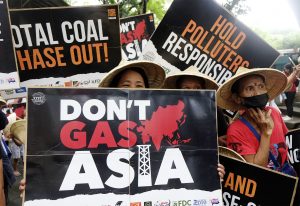TACLOBAN CITY– Environmental groups in the Philippines on Friday (Sept.15) joined the historic marches against fossil fuel projects that are planned across the world.

Ian Rivera, coordinator of the Philippine Movement for Climate Justice (PMCJ), said the success of a fast and fair fossil fuel phaseout “primarily lies with the leaders of developed countries with huge historical responsibility for the climate crisis.”
“Wealthy countries must deliver their full fair share of climate actions, including meeting their climate finance obligations so that developing countries, the least responsible but suffering the brunt of the climate crisis, can rapidly shift to efficient, safe, renewable energy,” he said.
Lidy Nacpil, coordinator of Asian People’s Movement on Debt and Development (APMDD), said that they are ramping up their efforts to convince world leaders to initiate actions to phase out the use of fossil fuel.
“We are escalating this fight in the face of the swiftly intensifying climate crisis and consequent impacts while governments continue to have low ambition and in fact are backtracking from their already weak commitments,” she said.
Nacpil’s group, along with more than 3,800 organizations around the globe, kicked off the Asia-wide protests that drew millions of people.
They have targeted 650 mobilizations and protest actions in 60 countries.
On September 15 alone, more than 20,000 people trooped to the streets in 10 Asian countries, including the Philippines, “to demand a rapid, just and equitable end to fossil fuels.”
On September 17th, climate activities staged the “March to End Fossil Fuels” in New York to demand President Joe Biden “take bold climate action by rejecting new fossil fuel projects, phasing out fossil fuel production, and declaring a climate emergency.”
On September 18, a 10,000-strong climate march took place in Tokyo, Japan organized by trade unions, environmental groups, and anti-nukes campaigners.
“With so many deceptive excuses, governments are expanding rather than phasing out gas and oil. Unproven unreliable solutions like carbon capture and removal technologies, hydrogen, and ammonia co-firing are being promoted to extend the life of coal energy,” said Nacpil.
“We are not just fighting for the communities living around fossil fuel infrastructures. The health and well-being of humanity and the planet is at stake. We are saying end fossil fuels fast, fair, forever because the fight against the fossil fuel industry needs to have equity and justice at the heart of it or it won’t succeed,” she added.
Environmental groups around the world demand that countries will rebuild their economies as post-carbon economies by 2050. (RONALD O.REYES)




